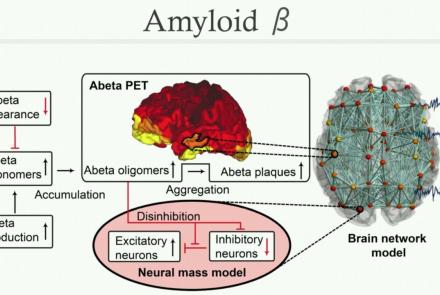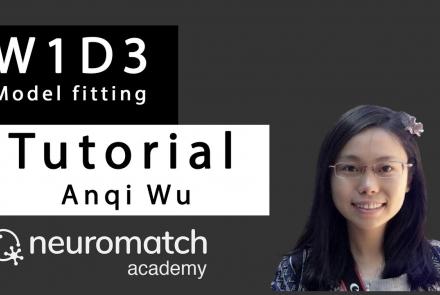This lesson covers "Knowledge Translation", the activities involved in moving research from the laboratory, the research journal, and the academic conference into the hands of people and organizations who can put it to practical use.
Difficulty level: Beginner
Duration: 15:05
Speaker: : Jordan Antflick
In this lesson, you will hear about the various methods developed and employed in managing performance.
Difficulty level: Beginner
Duration: 12:57
Speaker: : Christa Studzinski
This lesson provides an overview of how to manage relationships in a research context, while highlighting the need for effective communication at various levels.
Difficulty level: Beginner
Duration:
Speaker: : Helena Ledmyr
In this tutorial, you will learn how to use TVB-NEST toolbox on your local computer.
Difficulty level: Beginner
Duration: 2:16
This tutorial provides instruction on how to perform multi-scale simulation of Alzheimer's disease on The Virtual Brain Simulation Platform.
Difficulty level: Beginner
Duration: 29:08
This lecture provides an overview of successful open-access projects aimed at describing complex neuroscientific models, and makes a case for expanded use of resources in support of reproducibility and validation of models against experimental data.
Difficulty level: Beginner
Duration: 1:00:39
Speaker: : Sharon Crook
Course:
This lesson provides a brief overview of the Python programming language, with an emphasis on tools relevant to data scientists.
Difficulty level: Beginner
Duration: 1:16:36
Speaker: : Tal Yarkoni
Course:
The lecture provides an overview of the core skills and practical solutions required to practice reproducible research.
Difficulty level: Beginner
Duration: 1:25:17
Speaker: : Fernando Perez
This lecture on model types introduces the advantages of modeling, provide examples of different model types, and explain what modeling is all about.
Difficulty level: Beginner
Duration: 27:48
Speaker: : Gunnar Blohm
This lecture summarizes the concepts introduced in Model Types I and further explains how models can be used answer different scientific questions.
Difficulty level: Beginner
Duration: 32:30
Speaker: : Megan Peters
Course:
This lecture focuses on how to get from a scientific question to a model using concrete examples. We will present a 10-step practical guide on how to succeed in modeling. This lecture contains links to 2 tutorials, lecture/tutorial slides, suggested reading list, and 3 recorded Q&A sessions.
Difficulty level: Beginner
Duration: 29:52
Speaker: : Megan Peters
Course:
This lecture formalizes modeling as a decision process that is constrained by a precise problem statement and specific model goals. We provide real-life examples on how model building is usually less linear than presented in Modeling Practice I.
Difficulty level: Beginner
Duration: 22:51
Speaker: : Gunnar Blohm
Course:
This lecture focuses on the purpose of model fitting, approaches to model fitting, model fitting for linear models, and how to assess the quality and compare model fits. We will present a 10-step practical guide on how to succeed in modeling.
Difficulty level: Beginner
Duration: 26:46
Speaker: : Jan Drugowitsch
Course:
This lecture summarizes the concepts introduced in Model Fitting I and adds two additional concepts: 1) MLE is a frequentist way of looking at the data and the model, with its own limitations. 2) Side-by-side comparisons of bootstrapping and cross-validation.
Difficulty level: Beginner
Duration: 38.17
Speaker: : Kunlin Wei
This lecture provides an overview of the generalized linear models (GLM) course, originally a part of the Neuromatch Academy (NMA), an interactive online summer school held in 2020. NMA provided participants with experiences spanning from hands-on modeling experience to meta-science interpretation skills across just about everything that could reasonably be included in the label "computational neuroscience".
Difficulty level: Beginner
Duration: 33:58
Speaker: : Cristina Savin
This lecture further develops the concepts introduced in Machine Learning I. This lecture is part of the Neuromatch Academy (NMA), an interactive online computational neuroscience summer school held in 2020.
Difficulty level: Beginner
Duration: 29:30
Speaker: : I. Memming Park
This lesson provides an overview of the process of developing the TVB-NEST co-simulation on the EBRAINS infrastructure, and its use cases.
Difficulty level: Beginner
Duration: 25:14
Speaker: : Denis Perdikis
Course:
This lecture introduces the core concepts of dimensionality reduction.
Difficulty level: Beginner
Duration: 31:43
Speaker: : Byron Yu
Course:
This lecture covers the application of dimensionality reduction applied to multi-dimensional neural recordings using brain-computer interfaces with simultaneous spike recordings.
Difficulty level: Beginner
Duration: 30:15
Speaker: : Byron Yu
Course:
This is the first of a series of tutorials on fitting models to data. In this tutorial, we start with simple linear regression, using least squares optimization.
Difficulty level: Beginner
Duration: 6:18
Speaker: : Anqi Wu
Topics
- Artificial Intelligence (5)
- Philosophy of Science (5)
- Notebooks (2)
- (-) Connectomics (1)
- protein-protein interactions (1)
- Extracellular signaling (1)
- Animal models (2)
- (-) Assembly 2021 (27)
- Brain-hardware interfaces (12)
- Clinical neuroscience (3)
- International Brain Initiative (2)
- Repositories and science gateways (6)
- Resources (5)
- General neuroscience
(9)
- General neuroinformatics
(4)
- (-) Computational neuroscience (67)
- Statistics (1)
- (-) Computer Science (5)
- Genomics (1)
- Data science
(8)
- (-) Open science (11)
- (-) Project management (6)
- Education (1)
- Neuroethics (25)




















